Workforce and talent development topics of discussion at September BMF meeting

Workforce and talent development topics of discussion at September BMF meeting
At their quarterly meeting held Wednesday, Sept. 14, members of the NCBIO Biotech Manufacturers Forum learned about efforts and options for bolstering workforce and talent development in North Carolina. Members also received an update on the $25 million Build Back Better awarded to expand, connect and promote training and career opportunities in North Carolina.
The meeting was held at the NC Biotechnology Center.
The presenters were
- John Bulchanas, workforce director at the National Institute for Innovation in Manufacturing Biopharmaceuticals, or NIIMBL;
- Stephen Williams, practice lead at Actalent;
- Adria Graham Scott, deputy director of the Durham Workforce Development Board; and
- Katie Stember, Ph.D., director, life sciences development at NCBiotech.

John Bulchanas, workforce director at the National Institute for Innovation in Manufacturing Biopharmaceuticals, or NIMBL
After updates from NCBIO President Laura Gunter and BMF Program Manager John Wagner, John Bulchanas of NIIMBL took the podium to provide an overview of hiring and talent development from the institute’s perspective.
NIIMBL is a public-private partnership dedicated to advancing biopharmaceutical manufacturing innovation and workforce development. It is one of sixteen institutes in the Manufacturing USA Network that al have a common goal of driving U.S. leadership in advanced manufacturing.
Bulchanas said that NIIMBL has identified a number of challenges and barriers along the hiring continuum for advanced manufacturing. The future workforce doesn’t know about the life sciences industry, and building awareness is bigger than any one company. Continued growth in the advanced manufacturing sector calls for talent from a variety of backgrounds to become technicians, engineers, scientists and corporate professionals, he said. Recruiting from underrepresented populations has become a necessity, yet many companies have not developed strong recruiting efforts targeting these populations
“Diversity has gone from being the right thing to do to being mission critical,” Bulchanas said.
Companies need to create a stronger partnership between human resources and hiring managers to implement strategies for recruiting from a larger pool of talent, he said.
“I see it all the time at the national level where, in many cases, the technical hiring managers don't know their own HR departments,” Bulchanas said. “You have companies that are rolling out whole initiatives focused around stuff like dropping degree requirements, but their hiring managers don't know that or their hiring managers don't want to let that guide their decision making in terms of who they're hiring.”
There’s been growing interest within HR leadership to drop degree requirements from manufacturing roles but getting that idea to trickle down to hiring managers is challenging, Bulchanas said. The industry is seeing a resurgence of interest in nondegree pathways — such apprenticeships, certifications, credentials and microcredentials — but widespread industry adoption is not yet there.
“There's a renewed interest within the companies in embracing this kind of stuff, but there is yet to be one platform that companies really jump on,” Bulchanas said. “That said, I think Biowork remains a gem in North Carolina. It’s giving people what they need to get a foot in the door, and that’s what the industry is looking for at this time.”
Stephen Williams of Actalent gave an overview of what employees are looking for in the current climate, saying the three most important things are meaningful work, communication and room to grow.
“If there's anything the past two years have taught us with the pandemic, it’s what really matters to us and what's meaningful to us in our lives,” Williams said. “How well do the organizations in this room do describing what the opportunity is and the impact [a position] can have?
“People want impact, and they want to be working in meaningful careers.”
Employees also want consistent communication, he said.
“Nobody wants to be left in the dark or be worried about what’s happening,” Williams said. “Folks want to be in the know, they want to be informed. They want to feel like they have relationships with their senior leaders.”
Finally, employees are looking for continuous learning and development, Williams said. “People want the opportunity to grow and continue to expand themselves professionally.”
“You don’t want companies stealing from each other, but the reason they’re stealing from each other is there’s no opportunity for professional or personal growth within an organization so they [employees] look elsewhere because they feel like they’ve reached a ceiling.”
Williams identified some of the factors that are making it challenging to hire qualified employees in North Carolina, including:
- Competition from other industries in the advanced manufacturing space, such as Vinfast, Wolfspeed and Toyota, is shrinking the supply of talent.
- Compensation needs to be competitive with other advanced manufacturers, not just those in the life sciences.
- Employees are insisting on better work-life balance, and offering flexible arrangements makes an employer more attractive.
- Burnout is increasing as companies are doing more with less. Even if employees are compensated for extra hours worked, the practice isn’t sustainable long-term.
Adria Graham Scott of the Durham Workforce Development Board told attendees about the offerings of the Durham board, which is one of 22 similar development boards across the state, and shared a breakdown of wages and the job market in Durham County.
“The talent that you're going after has a less than 1% unemployment rate,” Scott said. The development board is working to expand that pool of talent.
Scott said there are three talent pools employers can draw from.
- Career-ready individuals have all the training, certifications and degrees needed to get right to work.
- Workplace-ready individuals may not have the training, but they have the soft skills needed to work a job and are ready, willing and able.
- Commitment-ready individuals want to work but are facing some sort of barrier and need extra support.
“That commitment ready group is the group that I think really has the most potential for you guys to mine,” Scott said. “This is where I believe that the workforce boards across the state, and especially in this region, can help you with a partnership.”
The boards have incentive programs for employers, can help with talent acquisition and can assist in developing workforce-ready learning programs, including apprenticeship programs and very specific training programs, Scott said. The board can also create an analysis of the labor market and environment to help employers target potential employees, and the board can help identify vetted employment candidates who are already in the system.
“We know that bringing in inexperienced talent is a cost, and by providing you with support, a partnership in those on-the-job training opportunities, we help to offset the risk and also the additional cost of bringing in an inexperienced person,” Scott said.
The BMF meeting wrapped up with Katie Stember of NCBiotech giving an overview of the nearly $25 million Phase 2 award from the U.S. Economic Development Administration’s Build Back Better Regional Challenge. The grant will focus on expanding training and job opportunities in life sciences manufacturing in a 79-county region, with the potential of benefitting all North Carolina counties.



